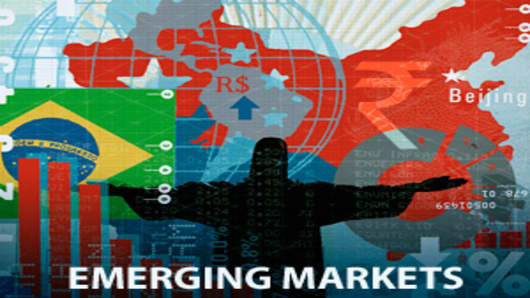Growth in emerging markets slowed to its weakest pace for more than two years between July and September as manufacturing output decelerated amid fears of a global slowdown, according to figures from HSBC.
The bank's emerging markets index hit 51.9, the fourth lowest since the index started.
"Other than the 08/09 crisis, this is the lowest we have been," Stephen King, Chief Global Economist at HSBC, told CNBC Wednesday.
HSBC warned that "imminent job losses are inevitable" as demand for goods manufactured in emerging markets slows in the US and Europe.
Manufacturing output in the index, which surveys purchasing managers in16 key emerging economies including China, India and Brazil, was negative in the third quarter, after more than two years of growth, while the services sector grew at its weakest pace in nine quarters.
"That's reflective of two things: the significant slowing of world trade this year, and secondly, the emerging nations have actually tightened monetary policy quite a long way because of fears of inflation," King said.
The slowdown was particularly marked in Asia.
Fears of declining growth in China, now the world's second-largest economy, have grown in recent months as a second recession in the US and the euro zone, two of China's largest trading partners, seemed more likely. There are also worries about the Chinese property market.
China Trouble?
Business confidence dipped to its lowest since the survey began in China, which suffered a marginal fall in its foreign orders.
Shares of China's "big four" banks rose Tuesday after Central Huijin Investment, a unit of the country's $400 billion sovereign wealth fund, raised its stake in the lenders, a move which increased speculation the country's government is planning more economic stimulus.
"The sovereign wealth fund is making a call that Chinese equities are much cheaper than they were," said King. "I don't think there's an indicator that somehow the whole thing is going to fall apart."
"There may be some worries about growth weakening a little bit, perhaps concerns about inflation, but beyond that, I don’t think this is a major crisis," he added.
Foreign order levels fell in almost all of the markets surveyed, with the Czech Republic, Saudi Arabia and United Arab Emirates the only countries which saw advance export orders rise. In the big four emerging markets, Brazil and India recorded the fastest rates of decline in new export orders.
There was some silver lining in the news that monetary tightening measures from central banks across emerging markets has helped rein in price pressures, according to HSBC, and the rate of input cost inflation has eased to a four-quarter low after global commodity prices fell.
Emerging markets are still set to outpace growth in the developed world, King believes.
"These are extraordinary, revolutionary times in terms of capital pouring into these markets, taking advantage of lower labor costs, high levels of education and transforming the global economy," he said.
"That part of the story doesn't change. There are cyclical ups and downs but beyond that the powerful shift in economic power in the world will continue."



